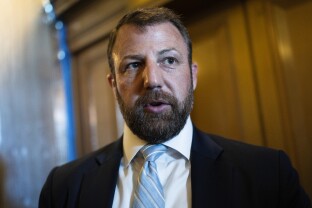President Donald Trump singled out Oklahoma as a state that would benefit from an overhaul of the Federal Emergency Management Agency — and some state leaders say they want change, too, but stopped short of calling to dissolve the agency.
The state was pummeled by a record-breaking 152 tornadoes last year and relied on the agency to front millions of dollars in federal grants, loans and payments after some of the storms. Meanwhile, Trump said he was considering “maybe getting rid of FEMA” and issued an executive order that tasks a new council to conduct “a full-scale review” of the agency.
Oklahoma Republican state Sen. Bill Coleman’s district was hit by a tornado that killed one person in May, and he said he got to the site when FEMA was setting up.
“The president’s asked for a council to review FEMA, and I’ve got no problem with that. They find something, it helps people in disasters, it’s better, that’s great,” Coleman said. “But in the meantime, I feel that [FEMA] is a help to people in times of disaster. Certainly, that’s what I witnessed eye to eye when I was over there.”
The Oklahoma Department of Emergency Management said it supports Trump’s “goal of giving states more authority over disaster funds.”
“It’s a great step toward making recovery efforts more efficient and tailored to local needs,” Keli Cain, public affairs director for the department, told NOTUS in a statement. Cain added that in close work with FEMA in the past, “we’ve had positive experiences.”
The White House responded “for now” to an inquiry about changes to FEMA by referring NOTUS to the executive order that establishes the review council and a second order addressing wildfires in California.
FEMA can provide funds and assistance before, during and after a disaster if the president approves a governor’s or tribal authority’s request to declare the disaster. Sometimes, the president can take weeks to declare a disaster after it occurs or doesn’t declare one at all.
Trump has long criticized FEMA, but he escalated his rhetoric calling for FEMA reforms after taking office this year. In his first interview since returning to office, he said, “I’d rather see the states take care of their own problems,” and pointed to Oklahoma as a state poised to embrace his proposal. And he emphasized his desire for change in remarks in North Carolina.
“To have a group of people come in from an area that don’t even know where they’re going in order to immediately solve a problem is something that never worked for me,” Trump said.
Trump’s deliberate messaging around changing FEMA is new to his second term, Pete Gaynor, a former FEMA administrator appointed in Trump’s first term, told NOTUS.
Gaynor said that between extreme weather and the COVID-19 pandemic, it was “all hands on deck” with disaster response during Trump’s last administration. This time, Trump may have more capacity to make changes to FEMA. Gaynor hopes changes are implemented incrementally using a tiered system, based on how experienced each state is in handling disasters.
“When you think about large, catastrophic, regional, multistate disasters, it erodes and burns the capabilities of the state and locals to respond,” he said. “The function of FEMA is to help backstop the state’s response. You just can’t say, ‘Turn it back to the states, and states, good luck, call us when you need us.’ That will not have a good ending.”
A one-size-fits-all approach to reduce federal involvement could have less disaster-prone states reeling, Gaynor said.
FEMA did not respond to a request for comment about what changes are underway in the new Trump administration.
Some members of the Oklahoma delegation criticized FEMA’s speed and said the state should have more authority over disaster response, but they didn’t suggest disbanding the agency.
“FEMA isn’t bad to work with, they’re just inefficient,” Sen. Markwayne Mullin told NOTUS. “What they do most of the time is they’re reimbursing the dollars more than they’re actually helping recover.”
“And to me, that defeats FEMA’s role.”
The agency would be faster if it “put the dollars closer to the state with our emergency management,” Mullin said. FEMA “drags their feet,” and Oklahoma’s departments could manage disasters more efficiently because they “live and breathe that neighborhood,” Mullin said.
Sen. James Lankford also recently introduced legislation to require a full review of federal agencies that deal with disasters to improve their budgets and efficiency.
“Often we’re waiting months to years for answers coming back from FEMA, when we need them to be much faster on that,” Lankford told NOTUS.
—
Em Luetkemeyer is a NOTUS reporter and an Allbritton Journalism Institute fellow.
Sign in
Log into your free account with your email. Don’t have one?
Check your email for a one-time code.
We sent a 4-digit code to . Enter the pin to confirm your account.
New code will be available in 1:00
Let’s try this again.
We encountered an error with the passcode sent to . Please reenter your email.


